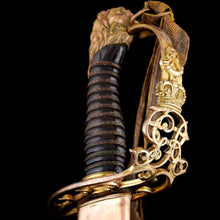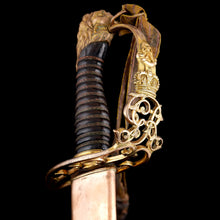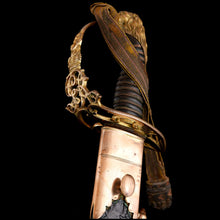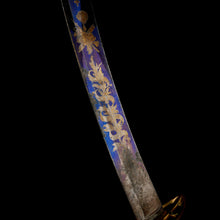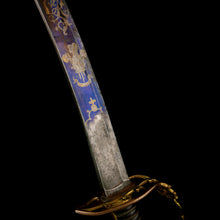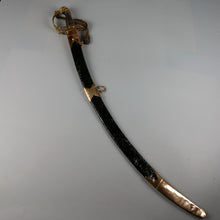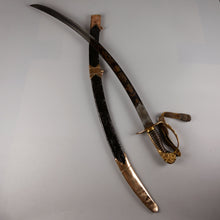A Light Company Officer’s Sword, 1803
- Regular price
- £4,400
- Sale price
- £4,400
- Regular price
-
- Unit price
- /per
Adding product to your cart
Overall: 94cm (37.5in)
A George III 1803 pattern infantry officer's sword, with curved, part-blued, fullered steel, 79cm (31in) single-edged blade decorated in bright gilt with a trophy of arms, foliage swags, the crowned Royal Arms and maker’s name 'REDDELL / & BATE / BIRMINGHAM / WARRANTED’, to one side, a stands of arms, foliage, crowned GR cypher and Prince of Wales’s feathers to the other, gilt-brass stirrup-hilt with slotted guard pierced with scrolls and knuckle-guard with pierced 'GR' cypher, with light infantry bugle and cords, original wire-bound grip and lion's-head pommel, sword-knot; contained in its gilt-brass mounted leather scabbard.
The development of the Pattern 1803 Flank Officer's sword originates with formation of grenadier and light companies in the late 18th century. These were considered the elite of both the Foot Guards and line infantry, and could be detached and deployed separately. The grenadier company was the senior company of any infantry battalion and would typically lead an assault. The light company fulfilled the skirmishing role for the battalion. When a battalion was deployed in line, the grenadier and light companies were deployed on the right and left flanks respectively, and both companies could be could be called upon to operate in looser formations and semi-independently. The added element of risk associated with detached skirmishing in looser formations meant that the officers of these companies needed a more robust fighting sword than the straight 1796 pattern.








